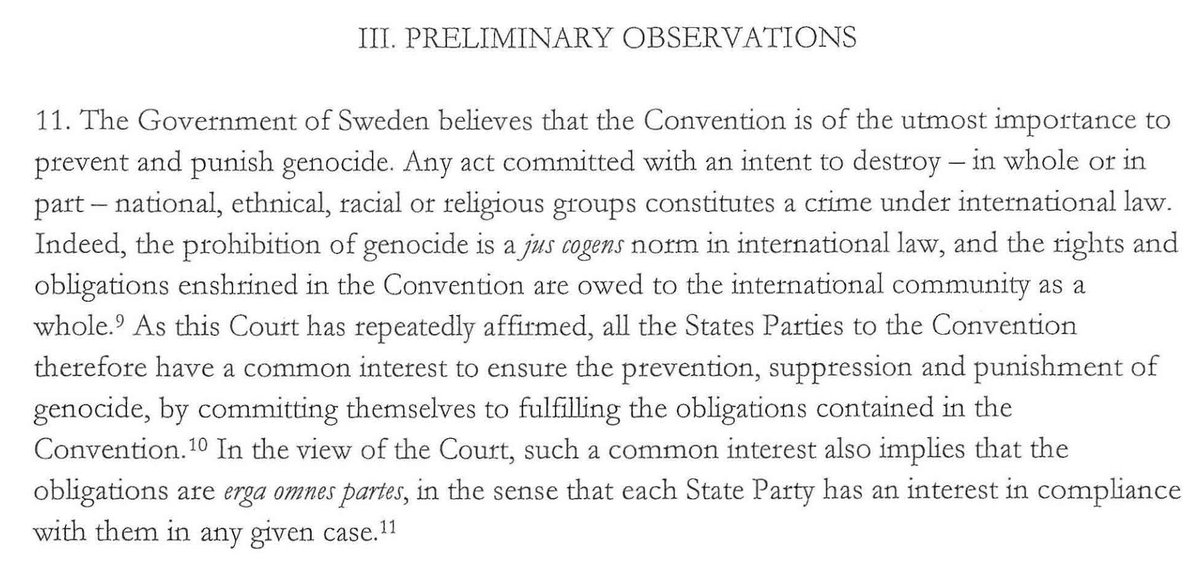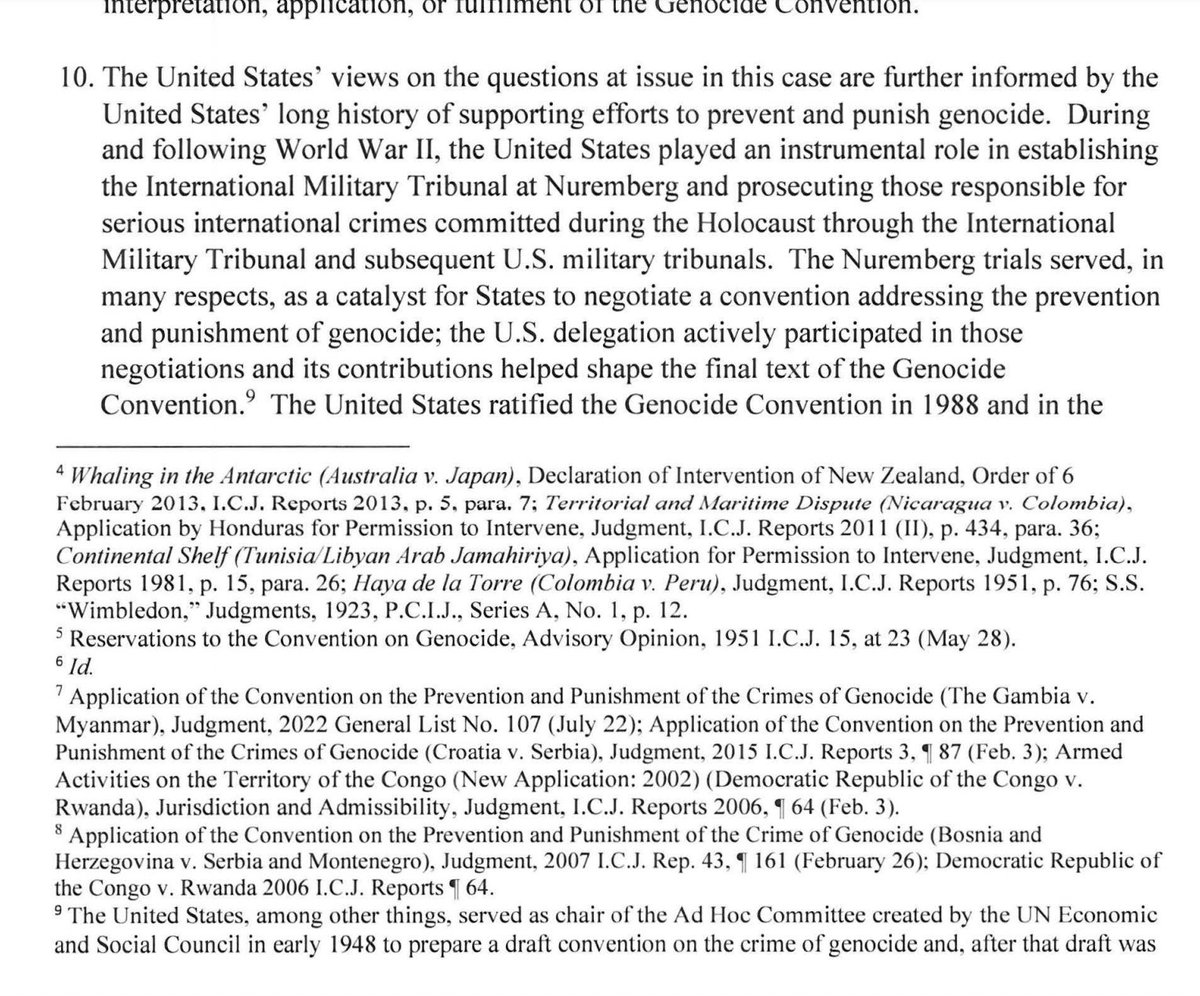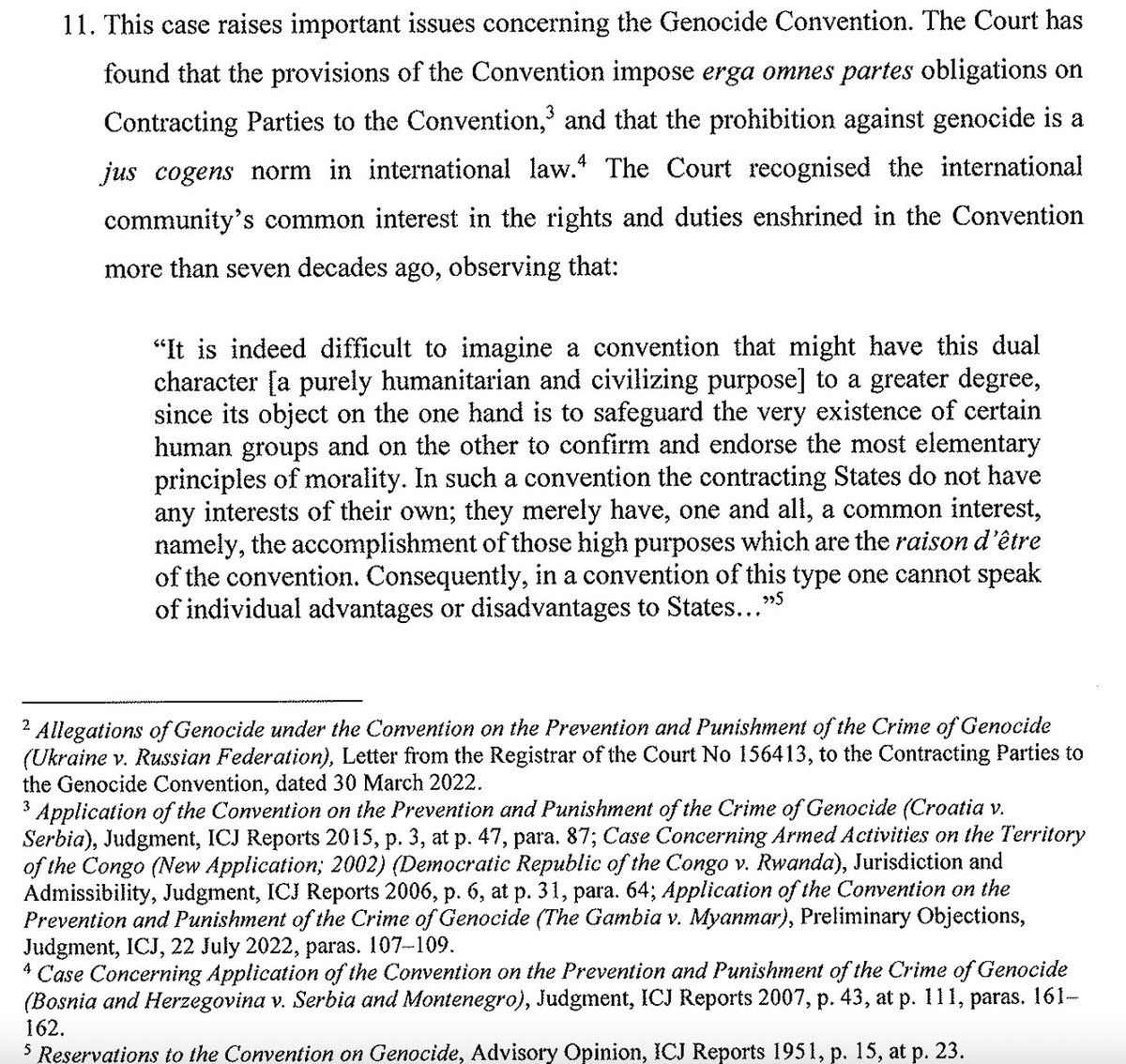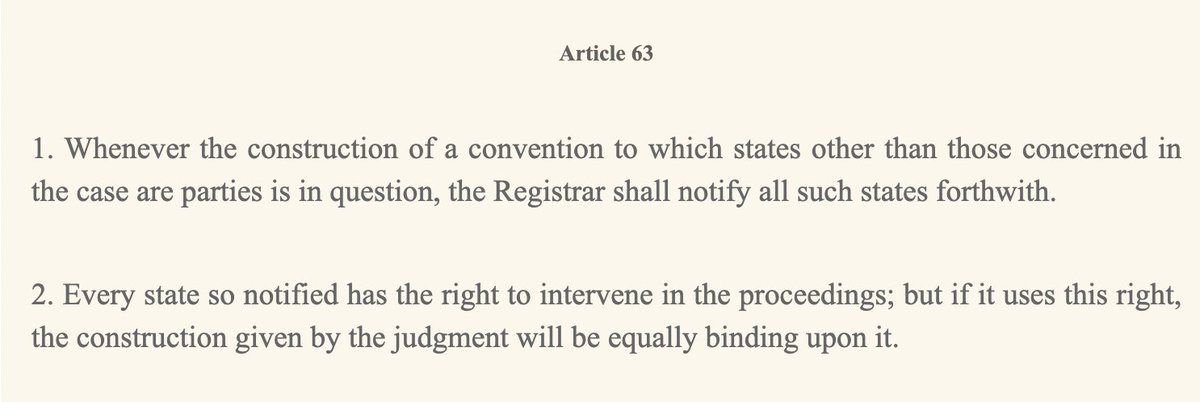
The text of #Sweden's 🇸🇪 declaration of intervention is now available on the #ICJ's website: icj-cij.org/public/files/c…
Observations 🪡. #Ukraine #Russia 1/25
Observations 🪡. #Ukraine #Russia 1/25
https://twitter.com/CIJ_ICJ/status/1568290026634477568
As is becoming routine for these interventions, Sweden invokes both its "right" to intervene under art 63 of the Statute and the nature of the obligations under the Genocide Convention (though first to cite Judge Cançado Trindade's sep op in the Whaling case order). 2/ 







For its personal touch, Sweden invokes itself being a "a keen proponent of a rules-based world order", finding that "it is necessary for it to intervene in this case, in order to place its interpretation of the relevant provisions of the Convention". 3/ 



Like 🇩🇪, Sweden is sensitive to the (somewhat) mass nature of the interventions, expressing willingness "to assist the Court in grouping this intervention with similar interventions from other States". However, like with 🇩🇪, not clear what "grouping" involves. 4/
On the substance of its intervention, Sweden cites arts I-III, VIII, IX as provisions that it will give its construction (seems to be typo in citing art III as provision defining genocide, rather than art II). 5/ 

In interpreting the provisions themselves, Sweden starts with art IX. Like others, Sweden addresses the more preliminary question whether art 63 intervention can extend to issues of jurisdiction, emphasising that the Statute and Rules contain nothing to preclude this. 6/ 



It addresses whether jurisdiction extends to negative declarations and (abusive) actions in applying Convention, answering affirmatively but perhaps in more detail than other interveners to-date, referring to ICJ's jurisprudence and doing a complete art 31(1) #VCLT analysis.7/
Some of the points Sweden makes were also made by other interveners, such as unique wording of compromissory clause ("fulfilment": 🇱🇻🇱🇹🇬🇧🇩🇪🇺🇸), and that "any of the parties" reinforces that an applicant can seek declaration of non-violation (🇬🇧). 8/ 

Sweden makes an intriguing statement when analysing ordinary meaning of art IX, by way of example. Noting that disputes under art IX can arise when one state alleges another committed genocide, it states that if ICJ "is not satisfied that there were any acts of genocide... 9/ 



...actually committed by the respondent State, it may decline jurisdiction, even prima facie".
However, in addition to perhaps undermining Ukraine's case, fn suggests conflation of prima facie jurisdiction for provisional measures with jurisdiction for adjudicating merits. 10/
However, in addition to perhaps undermining Ukraine's case, fn suggests conflation of prima facie jurisdiction for provisional measures with jurisdiction for adjudicating merits. 10/
Another point which doesn't seem to have been made before, in attempt to reinforce argument that jurisdiction extends to making "non-action" findings, Sweden refers to ICJ's previous recognition that jurisdiction extends to claims of failing to prevent and punish genocide. 11/ 

Again going further than the other interveners, Sweden considers Russia's argument in its 7 March communication that its invasion is based on self-defence under art 51 UN Charter and its implications for whether there exists a dispute regarding the Genocide Convention. 12/ 

Even before answering this question, in a footnote, Sweden alludes to a potential contradiction with Russia's contention, in the form of a speech by Putin annexed to the same communication which speaks of preventing and punishing genocide in Ukraine. 13/ 

Sweden (correctly) notes that the denial of a dispute does not ipso facto demonstrate its absence.
Going further, in a footnote, Sweden raises the possibility that the conflict of views between the parties on the existence of a dispute could give rise to jurisdiction. 14/

Going further, in a footnote, Sweden raises the possibility that the conflict of views between the parties on the existence of a dispute could give rise to jurisdiction. 14/


There are issues with the (half-hearted?) argument. First, it is difficult to reconcile with case in previous footnote (🇲🇭v🇬🇧) that dispute must "in principle" exist before Court seised (though strictly speaking that goes to ICJ Statute, not interpretation of Convention). 15/
Second, a dispute over whether there is a dispute is still not a dispute on the interpretation, application or fulfilment of Convention; ie, it does not itself evidence a conflict of views over whether Ukraine committed genocide. 16/
Sweden then discusses issues relating to the merits, and divides between three matters (though third matter essentially reinforces its analysis on the first): the obligation to prevent and punish genocide, the definition of genocide and recourse to UN organs. 17/
On prevention and punishment, and specifically whether Russia's invasion is in accordance with Convention, like 🇱🇻🇳🇿🇬🇧🇩🇪, Sweden begins by emphasising that obligation must be applied in good faith. 18/ 



Like 🇱🇻🇱🇹🇳🇿🇬🇧🇺🇸 (to varying degrees), Sweden does a rundown of the Convention provisions relating to prevention and punishment to frame in more concrete detail how obligation is to be fulfilled. 19/
Where it goes further than others (though referenced by 🇱🇻), Sweden expands on @UN_HRC June 2020 resolution on prevention of genocide and the best practices listed therein. 20/ 



All this leads to Sweden's conclusion that a state cannot rely on its obligation to prevent genocide if it has not done sufficiently assessed whether genocide is occurring, and its prevention must also be in conformity with aims of UN Charter. 21/ 

Like 🇱🇻🇱🇹🇬🇧, Sweden also briefly considers the obligation to punish genocide, emphasising that punishment of genocide is to have recourse criminal law mechanisms, rather than other coercive methods. 22/ 

Like 🇬🇧🇺🇸, Sweden then somewhat ventures into defining genocide, though primarily underlining ICJ's previous jurisprudence on the subject.
Before concluding Sweden returns to issue of prevention, underlining Convention's preference for collective measures pursuant to art VIII.23/


Before concluding Sweden returns to issue of prevention, underlining Convention's preference for collective measures pursuant to art VIII.23/



In conclusion, Sweden's declaration makes for an interesting read. It analyses perspectives which received less attention from other interveners. It makes some interesting arguments, though at times these are perhaps too creative. 24/
However the bottom line of the constructions it offers are quite uncontroversial: the existence of jurisdiction for non-violations, framing how the obligation of prevention and punishment is to be fulfilled and underlining the narrow definition of genocide. 25/25
• • •
Missing some Tweet in this thread? You can try to
force a refresh












